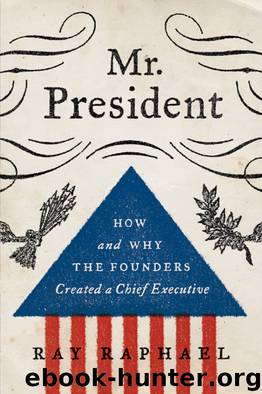Mr. President by Ray Raphael

Author:Ray Raphael [Raphael, Ray]
Language: eng
Format: epub
ISBN: 978-0-307-95856-3
Publisher: Knopf Doubleday Publishing Group
Published: 2012-03-05T16:00:00+00:00
Undoubtedly, Washington was just as displeased with the encounter. He was no stranger to seeking advice, but not in a venue such as this. On countless occasions during the Revolution the commander in chief had convened his war council; never did he take that body’s advice lightly, and often he allowed it to overrule him. Then, however, he was dealing with colleagues who shared both the information he had at his disposal and a certain level of professional expertise relevant to the items under consideration, whereas now members of the Senate were ill informed and not particularly conversant in the matters placed before them. Collectively, they saw themselves as a deliberative body; individually, each valued philosophical correctness and speechifying, sometimes at the expense of taking action. Was this really the right body to issue advice? And even if it were, what was to be gained by the president sitting through the arduous process?
The August 22 convergence of the executive and the legislative branches raised a serious question about the constitutional role of the Senate: Did it, or did it not, perform the function of an executive council? George Mason, at the Federal Convention and during the ratification debates, had lamented the absence of a separate and independent executive council, and here was a reason why. “Advice and Consent” might be a handy phrase, but this meeting revealed that offering advice and granting consent are two very different activities. If Washington sought only consent, he would have negotiated treaties first and then brought them to the Senate for ratification, as is done today, but the president asked for advice, as the Constitution stipulated, and to give advice, the Senate needed time to study the matter and engage in meaningful deliberations, which could not happen during one brief encounter. In this instance the Senate, with Washington again in attendance, resumed considerations two days later and responded to his questions, affirming his intentions on most but not all of the items, but the incident set a poor precedent. Would senators suspend their normal operations and take a rush course in diplomacy each and every time the executive department wanted to enter into negotiations with an Indian or European nation? How could they be kept apprised of the intricacies of international councils that might well occur on the other side of the Atlantic? Most critically, was this really the proper role of the upper house of the legislature?
The notion that the Senate would do the job of an executive council proved unworkable the first time it was put to the test. That body could serve as a check on the president’s power to negotiate treaties, but it was not particularly suited to offer counsel. Fortuitously, by affirming the president’s right to remove department heads, Congress had just facilitated the creation of a separate body of advisers who would offer counsel: the president’s “Cabinet Council,” as it was called in the early Republic. Although the word “cabinet” did not enter common usage for another four
Download
This site does not store any files on its server. We only index and link to content provided by other sites. Please contact the content providers to delete copyright contents if any and email us, we'll remove relevant links or contents immediately.
The Secret History by Donna Tartt(19088)
The Social Justice Warrior Handbook by Lisa De Pasquale(12190)
Thirteen Reasons Why by Jay Asher(8910)
This Is How You Lose Her by Junot Diaz(6887)
Weapons of Math Destruction by Cathy O'Neil(6280)
Zero to One by Peter Thiel(5802)
Beartown by Fredrik Backman(5754)
The Myth of the Strong Leader by Archie Brown(5508)
The Fire Next Time by James Baldwin(5446)
How Democracies Die by Steven Levitsky & Daniel Ziblatt(5219)
Promise Me, Dad by Joe Biden(5153)
Stone's Rules by Roger Stone(5088)
A Higher Loyalty: Truth, Lies, and Leadership by James Comey(4964)
100 Deadly Skills by Clint Emerson(4925)
Rise and Kill First by Ronen Bergman(4789)
Secrecy World by Jake Bernstein(4753)
The David Icke Guide to the Global Conspiracy (and how to end it) by David Icke(4720)
The Farm by Tom Rob Smith(4513)
The Doomsday Machine by Daniel Ellsberg(4490)
